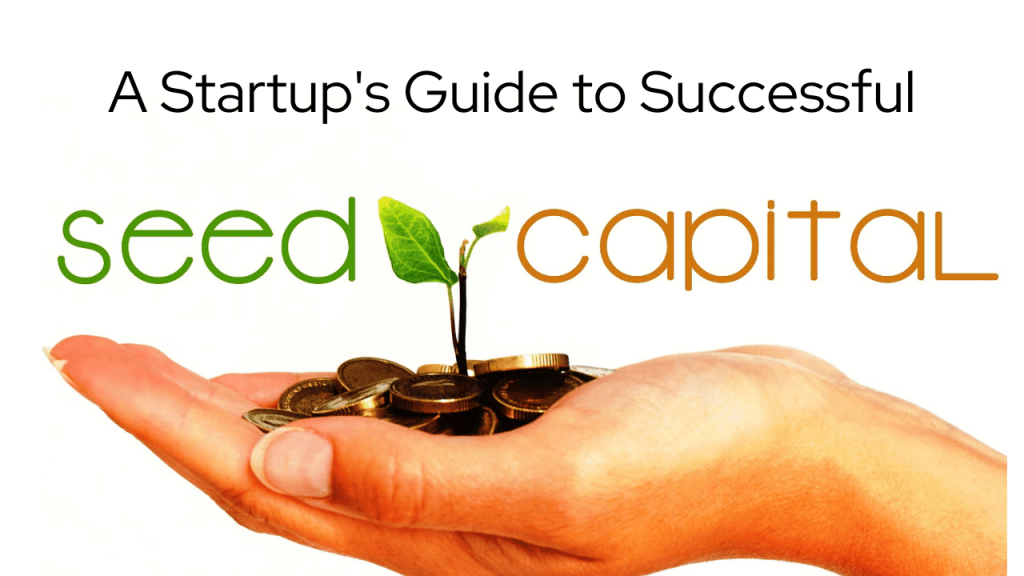A Startup’s Guide to Successful Seed Capital

A Startup’s Guide to Successful Seed Capital
When a new company commences its journey, securing funding becomes challenging due to the lack of a track record or proven success. Seeking investments from traditional sources like banks or investors might be tough initially.
Consequently, many startup leaders turn to close connections, such as family and friends, for initial investments, commonly known as seed capital. Seed capital, also termed seed money or seed financing, denotes the funds acquired by a business during its early stages. Typically, it’s a modest sum obtained from personal connections, covering essential startup requirements like a business plan, initial operational costs (rent, equipment, payroll, insurance), and research and development expenses (R&D).
During this phase, the primary objective is to attract more substantial financing from venture capitalists or banks. However, these entities are hesitant to invest in a concept solely existing on paper unless it originates from a successful serial entrepreneur. This generates a need to find seed investors for startups.
Why do startups need Seed Funding?
During the ideation stage, startups rely on three essential elements: capital, validation, and mentorship. Seed funding emerges as a critical factor in providing startup business investment. Here’s why seed funding holds such significance:
Financial Support
Securing capital is a prerequisite for any business venture. Securing seed investors for startups plays a foundational role in supplying the necessary economic resources. Furthermore, it helps to develop products and services, transforming conceptual business ideas into tangible realities.
Validation
In the pre-growth phase, validating ideas becomes crucial. Seed funding facilitates this process, enabling startups to recognize the viability of their products or services and affirm the soundness of their business strategies based on actual demand in the market.
Mentorship
Seed funding serves as a pivotal avenue for gaining mentorship during the initial years of a business. The guidance and expertise offered by investors are as valuable as the financial capital provided. This mentorship significantly aids startups in avoiding critical mistakes during the foundational stages of their development.
Basic steps involved
A strong founding team is crucial for attracting seed investors. Entrepreneurs create a detailed business plan outlining their product or service, target market, revenue model, and growth strategy. The business plan serves as a comprehensive document to communicate the startup’s vision and potential to investors.
Developing MVP: Develop a prototype or MVP to demonstrate the feasibility of the product or service. It helps validate the concept and attracts early interest.
Identification of Potential Investors: Identify and research potential seed investors for startups, including angel investors, venture capitalists, or seed-stage investment firms. Visit networking events, industry conferences, and online platforms to connect with investors.
Pitching to Investors: Entrepreneurs create a compelling pitch deck that highlights the business opportunity, market potential, competitive landscape, and financial projections. They present the pitch to potential investors, showcasing the value proposition and seeking funding.
Due Diligence: Investors conduct due diligence to assess the startup’s business model, market potential, financials, and the capability of the founding team. Entrepreneurs may be required to provide additional documentation and answer questions during this phase to secure their startup business investment.
Negotiation and Term Sheet: If investors are interested, negotiations begin on the terms of the investment. A term sheet outlines the key terms and conditions of the investment, including valuation, equity stake, and any protective provisions.
Legal Documentation: Once terms are agreed upon, legal documentation, such as investment agreements and shareholder agreements, is drafted and reviewed by both parties.
Funding and Post-Investment: After signing the agreements, the startup receives the seed funding. Post-investment, startups work closely with investors, leveraging their expertise and networks to accelerate growth.
Throughout this process, effective communication, a well-defined value proposition, and a compelling vision for the future are critical elements that contribute to successful seed funding.
SOURCES OF SEED FUNDING
Seed funding for startups can originate from diverse channels, with entrepreneurs frequently exploring multiple avenues to secure the necessary capital for their ventures. The following are typical sources of seed funding:
Angel Investors: Affluent individuals, known as angel investors, go for start up business investment in startups in exchange for equity. These investors not only contribute capital but also provide valuable mentorship and industry connections.
Venture Capital Firms (Seed-stage Funds): Certain venture capital (VC) firms manage seed-stage funds specifically tailored for early-stage startup investments. These funds are dedicated to supplying capital that assists startups in achieving key milestones and attracting subsequent investment.
Startup Accelerators and Incubators:
Programs like accelerators and incubators support startups through funding, mentorship, and resources, usually in exchange for equity. Graduating from these programs often positions startups favorably for additional funding opportunities.
Corporate Seed Funding Programs: Some larger corporations operate seed funding programs or innovation arms that invest in startups aligned with their strategic goals. These programs may not only offer funding but also potential opportunities for partnerships and collaborations.
Government Grants and Programs: Government agencies in certain regions provide grants, subsidies, or low-interest loans to support innovative startups and small businesses. These programs typically have specific eligibility criteria and application processes.
Other ways to gain startup business investment include collaboration with other businesses and even participating in pitch competitions and entrepreneurial contests. Winning such competitions not only injects funding but also provides valuable exposure.
Startups commonly leverage a combination of these funding sources to diversify their financial base, adapting their approach based on the nature of the startup, industry considerations, and specific entrepreneurial goals.
Challenges in Early Seed Funding
Product Development: Startups have limited brand value in the early stage. This poses difficulty in accessing funding and can impede the development of a minimum viable product (MVP), which is crucial for market testing.
Customer Acquisition and Trust: Early-stage startups typically struggle with acquiring customers, gaining market acceptance, and establishing customer trust. The lack of a proven track record can be a barrier to attracting a customer base.
Operational Processes: Novice founders may encounter challenges in building core teams, onboarding the right human resources, and other operational processes.
Business Model Complexity: The absence of a fully developed product or service often stands in the way of securing business investment for startups. Projecting revenue channels, defining unit economics, and formulating a comprehensive business model may be time-consuming and complex.
Conclusion
As previously noted, seed capital typically supports a startup in reaching its initial objectives. A successful performance during this phase may attract the attention of venture capitalists, who are more inclined to make substantial investments in the company’s advancement. You can also visit our website to know more at SPV Hub.
--------------------------------
Guestposted.com Notice!
Audience discretion is needed, Read TOS.
Submit Guest Post / Read Latest / Category List
App & Rate-Us / Subscribe Daily Newsletter (FREE)



